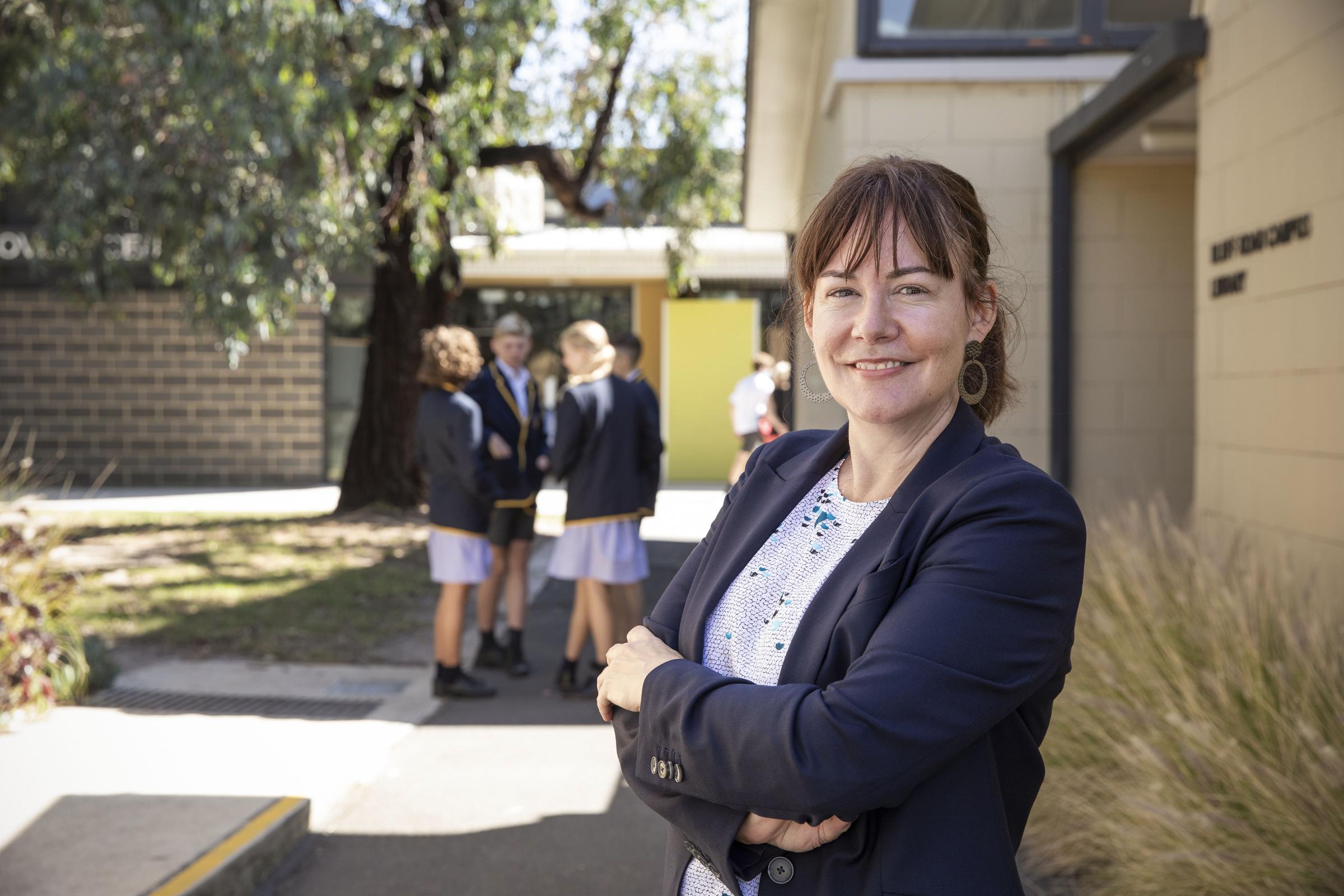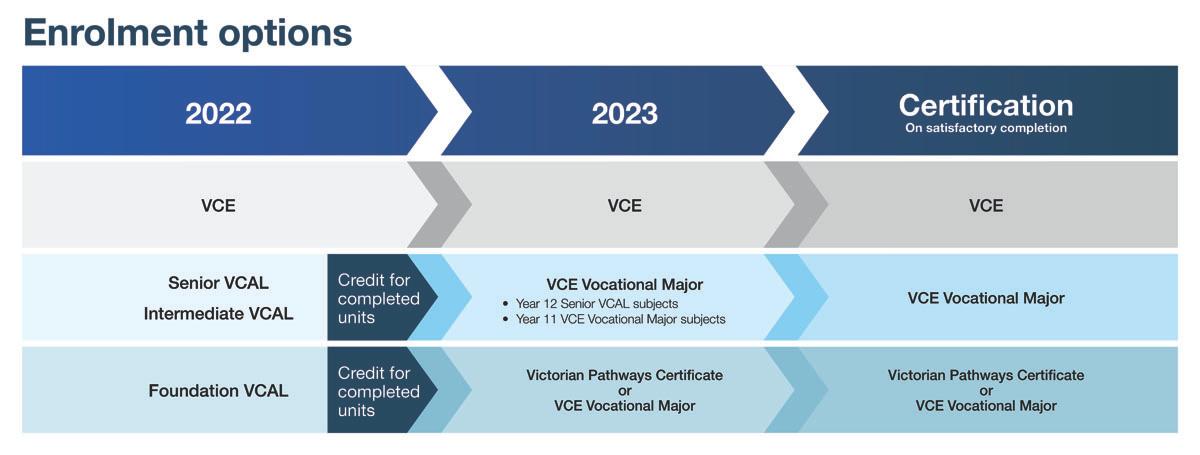College Principal report
Amy Porter

College Principal report
Amy Porter
Wominjeka... welcome
National Reconciliation Week is a chance for all schools to reflect and learn more about our shared history in Australia.
This year's theme, 'Be Brave. Make Change' challenges us all to tackle the unfinished business of reconciliation.
During the week, from Friday 27 May to Friday 3 June 2022, Reconciliation Australia is asking everyone to make change for the benefit of all Australians, beginning with brave actions in their daily lives – where they live, work and socialise.
What we do at Sandringham College
Where we want to go
Parents and carers would be aware that we have had a number of teachers leave Sandringham College this year. Of these teachers, only one has left to take up a position at another state secondary school. All other staff members have left to pursue careers outside of secondary teaching.
At our recent parent forum there were some concerns raised about the large change over in staff over the last few years. When I first joined Sandringham College six years ago, most of the teachers at the school had been teaching for over twenty years (about 80%) and many were close to retirement. Over the course of the past two years many staff have retired after extensive contribution to our school. A few have also left because they have decided to change careers post COVID. We are certainly not alone in this trend and there is currently a teacher shortage, or pending teacher shortage across the states of Victoria, NSW and Queensland caused by many factors but certainly in part by the impact of COVID.
We have been extremely lucky in the Bayside area to be able to attract and retain great staff and over the past 4 years we have employed a group of amazing graduate teachers who have added much value to our school and enriched the learning of our students.
2019 - 2021
Eileen Gamzuletova, James Kerr, Elaine Bromidis, Julia Vogel, Quinn Daly, Tim Clifton, Duncan Wallace, Estelle Ashkar, Jia Chen, Laura Hulley, Rhys Morgan, Callum McCombe, Casey Irwin, Sean Mundy, Prue Slingsby, Ned Vasey and Matthew Newman.
2022
Leah Biondo, Ross Clark, Alyssa Gou, Katelyn Thompson, Alex Christopoulos and Jacky Guan.
Many of these graduates are now taking on positions of responsibility at our school - Year Level Leader, Domain Leader, Student Leadership Coordinator, Art Academy Leader. Some have stepped up to take their first VCE or Year 12 class. They are adding value to our school in so many ways and are being supported and mentored by our more experienced teachers and leaders.
Another concern raised was around the number of teachers teaching outside their 'method'. A method is the specific area that you are trained to teach - most teachers have two areas. I myself have always taught outside my methods of media and theatre/drama. Over the past 20 years I have taught - drama, media, theatre studies, English, history, geography, dance, religious education and sport education. Many teachers will teach a subject outside their 'method' at some stage in their career. What they teach will be closely aligned with their qualifications - for example, I studied history at university, this is why I was asked to teach it in the UK.
Statistically we currently have the equivalent of only 2.5% of teachers teaching a class outside of their method, this is a very low figure.
The 2.5% figure excludes teachers teaching Work Related Skills and Personal Development in VCAL. There is currently no university qualification for teaching VCAL, something that will hopefully be rectified with the introduction of the new VCE - Vocational Major Senior School Certificate.
Victoria is moving to a new integrated senior secondary certificate that will bring together our two senior secondary certificates, the VCE and Victorian Certificate of Applied
Learning (VCAL). This will give all students the learning opportunities to develop the skills and capabilities needed to succeed in further education, work and life.
From 2023, enrolment options for Year 11 and 12 students will include:
• the Victorian Certificate of Education (VCE) Vocational Major
• the Victorian Pathways Certificate (VPC).
A fully integrated VCE will be implemented from 2025.


VCE – Vocational Major
This is a two-year vocational and applied learning program that will replace Senior and Intermediate VCAL and offer a program that enables successful transitions into apprenticeships, traineeships, further education and training, or directly into employment.
VPC – Victorian Pathways Certificate
This is designed to support students to transition either to the VCE Vocational Major or to entry level VET or employment. The VPC is suitable for students whose previous schooling experience may have been disrupted for a variety of reasons, including students with additional needs, students who have missed significant periods of learning and vulnerable students at risk of disengaging from their education. The VPC will replace Foundation VCAL from 2023. The VPC will support students to transition to the VCE Vocational Major, entry level VET or employment. The VPC has been developed to be flexible, without a mandated period in which a student must complete the certificate. This allows students to complete it in a timeframe that suits their capability.
VPC is not a Senior School Certificate but will be recognised as a level 1 qualification under the Australian Qualifications Framework
The purpose of the Certificate I qualification type is to qualify individuals with basic functional knowledge and skills to undertake work, further learning and community involvement.
Certificate I qualifications are located at level 1 of the Australian Qualifications Framework.
Certificate I qualifications must be designed and accredited to enable graduates to demonstrate the learning outcomes expressed as knowledge, skills and the application of knowledge and skills specified in the level 1 criteria and the Certificate I descriptor
Assessment of VCE Vocational Major studies
Unlike other VCE studies there are no external assessments of VCE VM Unit 3–4 sequences, and VCE VM studies do not receive a study score. If a student wishes to receive study scores, they can choose from the wide range of VCE studies and scored VCE VET programs that contain both internal and external assessment components.
The VCE VM studies do not contribute to the ATAR. To receive an ATAR a student must complete a scored Unit 3-4 sequence from the English group and three other Unit 3–4 scored sequences. Students must achieve two or more graded assessments in these scored sequences.
General Achievement Test
All students studying at least one Unit 3 and 4 VCE subject (including a VCE VM Unit 3 and 4 subject) or a scored VCE VET subject are expected to sit all or a section of the General Achievement Test (GAT).
The GAT is a General Achievement Test that measures a student’s general knowledge and skills in written communication, mathematics, science, technology, humanities, the arts and social sciences. It also measures a student’s literacy and numeracy skills against a new standard, introduced in 2022.
The new standard will indicate whether students have demonstrated the literacy and numeracy skills typically expected of someone completing their secondary schooling – giving another indication of their readiness to move onto further education, training or employment.
Dear parents, carers and guardians
I am writing to let you know about changes to the provision of Rapid Antigen Tests (RATs) in our school for the remainder of Term 2.
RATs will continue to be distributed to you as they have been throughout this school year for the remainder of this term.
However, from Monday 23 May 2022, students will no longer be recommended to undertake either twice weekly RATs in mainstream schools or 5 days a week in specialist schools.
RATs however will continue to be required by students who are household contacts to attend school (5 negative tests over a 7 day period) or who have symptoms.
The ongoing supply of RATs to families in our school will ensure that parents and carers will have them should they need them if their child is a household contact or has symptoms.
Families must continue to notify the Department of Health and the school if their child returns a positive RAT result. Additionally, you should inform us if any of your children are household contacts.
Thank you also to all families who has got their child vaccinated. Vaccination continues to remain the best way to protect students and staff in our school.
Getting vaccinated is easy and bookings can be done via the coronavirus website. If you have any questions about the vaccines, I encourage you to speak to your GP or a health practitioner.
Thank you again for your ongoing cooperation and support during this time.
Dept. of Education and Training (DET)